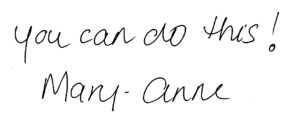Current neuroscientific research shows us that your brain changes according to your thoughts. The change will be positive or negative depending on your state of mind. Your brain is a very adjustable organ, changing its architecture based on how you use it. The more it is used in a certain way, the better it gets at that task or thinking process. The bad news is that the more one dwells on negative thoughts, the more one ‘rehearses’ negative mindsets, the better the brain will perform these negative cycles and the quicker feelings like panic and despair set in. The good news is that this works in the opposite direction as well. The more you engage your mind in positive mindsets and thought patterns, the better your brain will become at fighting off the dark thoughts. You are essentially training your brain to feel good.
Choose your thoughts
You may say, how can I force myself to think positive thoughts when in fact I feel horrible? Well, in fact you really can choose your mood and how you react to circumstances in your life. It really is up to you. Think of it as a fork in the road: the one way is a well-rehearsed pattern of ever darkening thoughts, actions and reactions; the other way is a purposeful series of choices to not participate in the negative cycle, but instead choose an opposite positive response.
Below are some really important pointers to help you kick the habit of negative thinking.
Awareness
You cannot change anything unless you first become aware that you are doing it. Answer the following questions truthfully.
- Spot recurring patterns – Is there a pattern of thought or action in your life that keeps repeating itself? Is there anything that keeps coming up that possibly started way back in your past? Can you relate some of your current struggles to past events? For example, some people say that they keep making wrong decisions in their choice of a partner, ending up in an abusive relationship over and over again. Write these patterns down in a journal. Acknowledge that they are there. Recognize that there is a dynamic at work in your life that keeps drawing you into the same dilemma.
- Recognize your triggers – What behaviors trigger you? What events set you off into a negative spiral? Write these down. Being aware of the triggers will help you avoid them in the future. Remember that your brain has learned to behave a certain way. A trigger like this can set the whole chain of events in motion without any further effort on your part.
- Know your coping mechanisms – What coping mechanisms do you use when you feel that you are losing control? Are these negative or positive? Write them down. Coping mechanisms are unavoidable since nobody likes to feel miserable, but some lead you into further trouble. Becoming aware of the coping mechanism and whether it’s good or bad for you will help you replace it if needed.
Breaking Through
Change is possible. With dedication, commitment and some clever strategy, you can change your world around!
- React in the opposite spirit – If you are about to throw your arms up in despair when you encounter that usual stressful situation at work, recognize that you are about to start the cycle and that you are at that fork in the road. Reject your usual response and start going in the opposite direction. Do you want to snap back at your partner right now? Love him instead. Do you want to run away from your problem? Run towards it instead (explore it, analyze it). This will seriously disrupt the habitual brain cycle. You are reprogramming your brain!!
- Get help – There are some great techniques that can help and there are counseling professionals who are trained to guide you through this process. Tools like Cognitive Behavioral Therapy (CBT) can be of great help. EMDR is another powerful intervention to provoke a breakthrough if thoughts continue to remain stuck and seem to not want to budge even with the greatest of effort.
- Stick with it – For new behaviors to become second nature, repetition and mental rehearsal of new behaviors in frequent intervals is essential. Change is not instant. It takes time and practice. Stick with it, even if you trip up at times (you will).
Don’t lose hope, even if you feel trapped. The door is open for change. You don’t have to do it all at once. Just take the first step. One step at a time is all you need.
Contact me for a free counseling consultation today. My counseling practice is situated in Monterey and my contact number is 831-444-1747.
PS: I accept payment from several insurances and payers: Aspire, Coastal, MBIPA, MHN, HMC Healthworks, Victims of Crime. Check on your insurance card under Mental Health benefits to verify what coverage you have.
Many clients pay cash for their sessions (my fee is $125 per session or lower negotiated rate in special circumstances) and then submit the superbill provided by me to their insurance for possible reimbursement. See here under the FAQ section for some more information.

